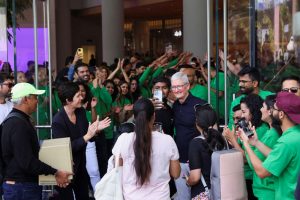US tech giant Apple plans to double its production of iPhones in India to avoid impacts from the Trump Administration’s tariffs, according to a new report.
All iPhones sold in the United States – more than 60 million – will be assembled in India from as soon as next year to avoid levies on goods exported from China, the FT said, citing sources familiar with the situation.
Apple has used contract manufacturers such as Tata Electronics and Foxconn to build its manufacturing capacity in India, but reportedly still relies heavily on China for hundreds of components, the report said.
ALSO SEE: Tariffs Must be Scrapped if US Truly Wants a Trade Fix: China
US President Donald Trump announced ‘reciprocal’ tariffs on all trading partners on April 2, but has imposed a temporary pause on smartphones.
China currently faces tariffs of up to 145% although that levy could be slashed if Beijing undertakes trade talks with Washington.
Meanwhile, India faces a reciprocal tariff of 26% but that levy has been paused while the Modi government discusses a bilateral trade agreement with Trump’s senior trade officials.
Apple’s dealings with Trump administration
Apple, which was seen by many analysts as a potential loser in the escalating US-China trade war, enjoyed a 15% stock rebound earlier this month thanks to deals negotiated with the new US administration.
News emerged just over two weeks ago that the US conglomerate chartered cargo flights to ferry 600 tons of iPhones – as many as 1.5 million – from India to build a bigger inventory in the United States.
That shipment came from a ramped-up production effort that aimed to beat the deadline for President Donald Trump’s tariffs, sources told Reuters.
Apple sells more than 230 million iPhones a year worldwide, with International Data Corporation saying the US market accounts for 28% of Apple’s total iPhone imports, most of which previously came from China.

Chief executive Tim Cook is said to have worked hard for months to protect Apple from the full impact of Trump’s tariffs and been in regular contact with Trump and his team at the White House.
He was reported to have secured a temporary exemption for iPhones, Macs, Apple Watches, and iPads from the bulk of Trump’s 145% tariffs on Chinese imports after phone calls with Commerce Secretary Howard Lutnick and other senior White House officials, according to a report by MacRumors.
The key to that success appears to have been a pledge in February that the company would invest $500 billion in the United States.
That money will be used to build an AI server manufacturing facility in Houston, fund a supplier academy to train US manufacturers and focus on research and development, artificial intelligence and silicon engineering.
It will also expand data centres in a handful of states, as part of moves that will allegedly create about 20,000 jobs.
Delicate geopolitical dealings
Apple has been secretive about its production, partly because it has to manage delicate geopolitical tensions between both the US and China, plus India and China.
The tech giant’s Taiwanese supplier Foxconn is now said to be producing Apple’s latest smartphone, the iPhone 16 Pro, but it still needs to develop a strong portfolio of component suppliers.
And a report in February alleged that Beijing was blocking the movement of some Chinese technicians and capital goods to India.
Apple’s relations with Beijing became more turbulent 18 months ago when Beijing cracked down government employees’ use of iPhones. And sales in China have been hit further by increased competition from Huawei and other domestic firms favoured by local authorities.
- Jim Pollard
NOTE: The headline on this report was amended and further text added at the bottom on April 25, 2025.























